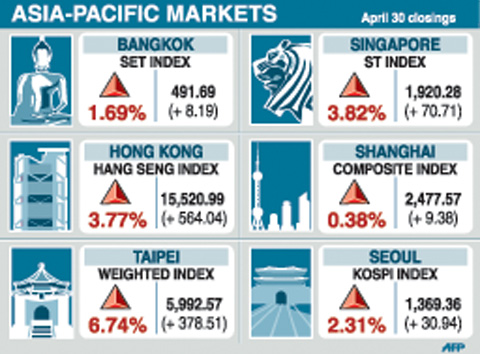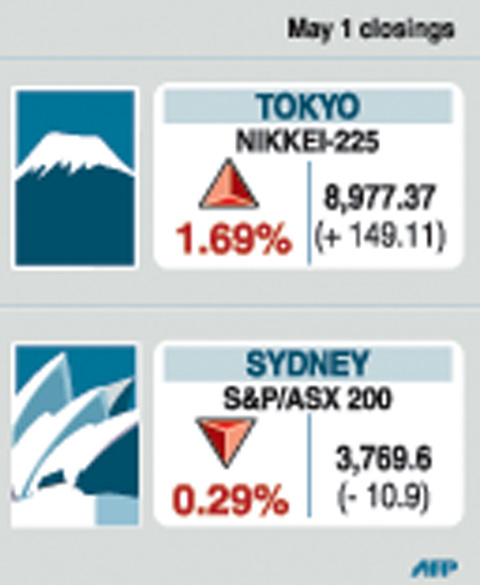Asian stocks advanced for the seventh time in eight weeks, sending a regional index to the highest level in four months, as production and earnings figures lifted confidence that the region’s economies have started to recover.
Canon Inc, the world’s largest seller of digital cameras, gained 8.1 percent after cost cuts helped the company boost its profit forecast and Japan’s production levels increased for the first time in six months. Li & Fung Ltd (利豐), the biggest supplier of toys and clothes to Wal-Mart Stores Inc, added 10 percent ahead of a report that Chinese manufacturing increased for a fifth month. Lion Nathan Ltd soared 41 percent after receiving a takeover offer.
The MSCI Asia-Pacific Index added 1.6 percent this week to 90.91, a level not seen since Jan. 7. Asian markets have rallied 29 percent since the MSCI benchmark dropped to an almost six-year low on March 9.

“All the things are in place for the bear market to have ended,” Anthony Bolton, London-based president of investments at Fidelity International, which oversees US$157.3 billion, told Bloomberg Television in Hong Kong. “We’re going to see a slow economic upturn, but that’s enough for the stock market. If you wait for things to get better, you’ll miss the rally.”
Japan’s Nikkei 225 Stock Average surged 3.1 percent to 8,977.37. Indonesia’s Jakarta Composite Index posted the region’s largest gain with an 8.3 percent advance after companies including PT Bank Rakyat Indonesia, the country’s No. 2 financial services provider, reported rising profits.
Markets shrugged off the outbreak of swine flu, and the bankruptcy of Chrysler LLC on Thursday also failed to derail market gains.

MSCI’s Asian index plunged by a record 43 percent last year as the credit crunch tipped the world’s largest economies into recession, forcing companies to idle factories and lay off workers.
Taiwan’s TAIEX index posted its steepest gain since 1991 on Thursday as the government allowed Chinese investments for the first time since a civil war ended six decades ago.
In the week to Thursday, the weighted index rose 111.80 points, or 1.90 percent, to 5,992.57 as Thursday’s rally made up losses earlier in the week on swine flu fears.
Average daily turnover stood at NT$128.28 billion (US$3.86 billion), compared with NT$130.81 billion a week earlier.
The market was closed on Friday for the Labor Day holiday.
Far EasTone Telecommunications Co (遠傳電信), Taiwan’s third-largest phone company, surged by 7.6 percent to NT$37.65 after China Mobile Ltd (中國移動) offered to buy a 12 percent stake for NT$17.77 billion (US$529 million).
Taiwanese share prices are expected to extend their gains next week on hopes over improving relations with China, dealers said on Thursday.
Buying next week may focus on large-cap electronic and financial stocks to help push the market past the psychological 6,000-point level and challenge 6,200 points, dealers said.
However, profit taking may emerge in the second half of the week as an outbreak of swine flu remains a concern to the already weak global economy, they said.

MISINFORMATION: The generated content tends to adopt China’s official stance, such as ‘Taiwan is currently governed by the Chinese central government,’ the NSB said Five China-developed artificial intelligence (AI) language models exhibit cybersecurity risks and content biases, an inspection conducted by the National Security Bureau (NSB) showed. The five AI tools are: DeepSeek, Doubao (豆包), Yiyan (文心一言), Tongyi (通義千問) and Yuanbao (騰訊元寶), the bureau said, advising people to remain vigilant to protect personal data privacy and corporate business secrets. The NSB said it, in accordance with the National Intelligence Services Act (國家情報工作法), has reviewed international cybersecurity reports and intelligence, and coordinated with the Ministry of Justice Investigation Bureau and the National Police Agency’s Criminal Investigation Bureau to conduct an inspection of China-made AI language

BOOST IN CONFIDENCE: The sale sends a clear message of support for Taiwan and dispels rumors that US President Donald Trump ‘sold out’ the nation, an expert said The US government on Thursday announced a possible sale to Taiwan of fighter jet parts, which was estimated to cost about US$330 million, in a move that an expert said “sends a clear message of support for Taiwan” amid fears that Washington might be wavering in its attitude toward Taipei. It was the first announcement of an arms sale to Taiwan since US President Donald Trump returned to the White House earlier this year. The proposed package includes non-standard components, spare and repair parts, consumables and accessories, as well repair and return support for the F-16, C-130 and Indigenous Defense Fighter aircraft,

CHECKING BOUNDARIES: China wants to disrupt solidarity among democracies and test their red lines, but it is instead pushing nations to become more united, an expert said The US Department of State on Friday expressed deep concern over a Chinese public security agency’s investigation into Legislator Puma Shen (沈伯洋) for “secession.” “China’s actions threaten free speech and erode norms that have underpinned the cross-strait ‘status quo’ for decades,” a US Department of State spokesperson said. The Chongqing Municipal Public Security Bureau late last month listed Shen as “wanted” and launched an investigation into alleged “secession-related” criminal activities, including his founding of the Kuma Academy, a civil defense organization that prepares people for an invasion by China. The spokesperson said that the US was “deeply concerned” about the bureau investigating Shen

LIMITS: While China increases military pressure on Taiwan and expands its use of cognitive warfare, it is unwilling to target tech supply chains, the report said US and Taiwan military officials have warned that the Chinese People’s Liberation Army (PLA) could implement a blockade within “a matter of hours” and need only “minimal conversion time” prior to an attack on Taiwan, a report released on Tuesday by the US Senate’s China Economic and Security Review Commission said. “While there is no indication that China is planning an imminent attack, the United States and its allies and partners can no longer assume that a Taiwan contingency is a distant possibility for which they would have ample time to prepare,” it said. The commission made the comments in its annual